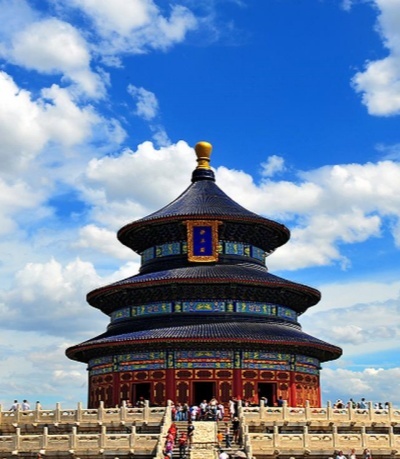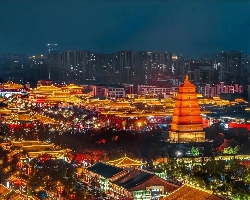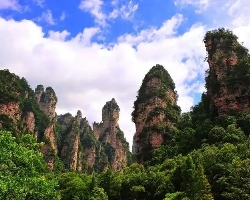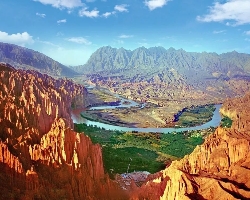- Home
- Tour Packages
- Destination
- About Us
- Contact
- Reviews
- Travel Guide
-
-
- Must-Go Destination Travel Guides
- Yunnan
- Guizhou
- Pingyao
- Hangzhou
- Guangzhou
- Guilin
- Chongqing
- Datong
- Huangshan
- Xiamen
-
-
-
- Customize Your Trip
This 9-day tour showcases China’s ancient villages and diverse ethnic cultures in Guizhou province. Your journey begins in Guiyang. It is richly represented by its diverse ethnic groups. Next, you’ll visit Kaili, the cultural hub of the Miao people. Here, you can experience their vibrant customs and colorful festivals. The tour then takes you to Rongjiang, known for its stunning rice terraces and traditional architecture. In Zhaoxing, one of China’s most picturesque Dong villages, you’ll marvel at iconic drum towers and wind-and-rain bridges. This tour lets you see old Chinese villages, learn about different ethnic groups, hike in beautiful places.
Undoubtedly, you’ll see parts of China that many tourists don’t visit. It’s a great way to learn about China’s different cultures. This unique itinerary explores off-the-beaten-path destinations in China. You’ll witness ancient villages, learn about various ethnic groups, and immerse yourself in breathtaking landscapes. It’s an unparalleled opportunity to experience China’s cultural diversity and hidden treasures.
- Round way private transfer in each destination
- Professional licensed English-speaking guide
- Entrance tickets for all historical & cultural attractions as listed in the itinerary
- Hotel accommodations in each destionation based on twin-sharing basis
- Meals as specified in the itinerary ( B=Breakfast, L=Lunch, D=Dinner)
- Bottled drinking water and wet tissue
Included
- China visas and international flights entry & exit of China
- Hotel single room supplement in Guiyang, Kaili, Xijiang, Rongjiang and Zhaoxing
- Tipping for guide and driver
- Other expenses if not listed in the itinerary
Excluded
Highlights of the Tour
- Guiyang: Dive into the vibrant city of Guiyang, the lively capital of Guizhou Province, known for its rich blend of modern amenities and traditional culture. Explore the bustling streets, visit the lively night markets, and enjoy local delicacies such as spicy street food. Guiyang also serves as a gateway to the province's stunning natural landscapes and ethnic villages.
- Anshun: Visit Anshun, famed for its natural wonders including the magnificent Huangguoshu Waterfall, one of China's largest and most impressive cascades. The city is also a gateway to the beautiful Dragon Palace Cave, where you can explore stunning underground rivers and unique rock formations.
- Kaili: Discover Kaili, the cultural heart of Guizhou's Miao and Dong ethnic minorities. Immerse yourself in the colorful traditions and festivals of these vibrant communities, and visit nearby ethnic villages to experience traditional crafts, music, and dance, offering a rich cultural and anthropological insight.
- Leigongshan: Experience the breathtaking beauty of Leigongshan (Thunder Mountain), known for its dramatic landscapes and lush greenery. As a nature lover’s paradise, it offers stunning hiking trails, serene mountain views, and a chance to connect with the untouched natural beauty of Guizhou's highlands.
Itinerary
Collapse All
- Our guide and driver will meet you at the airport or train station upon arrival. Private transfer to the hotel for a short rest.
- if time permits, you will drive to Qingyan Ancient Town in the southern countryside of Guiyang city. With a history of over 600 years, this town was originally built for military purposes and all the buildings are constructed entirely of stone. Spend a leisurely afternoon exploring this historical and cultural town, where you'll see well-preserved relics and original architectural styles. Later, return to your hotel for the evening.
- Located in the Southwest of China, Guizhou province is renowned for its vibrant culture, which is richly represented by its diverse ethnic groups. In the coming 9 days, you will have the opportunity to visit several ethnic villages and explore the unique customs and traditions of different minority groups in China.
- Visit Qingyan Ancient Town
- Stay in Guiyang
- Today, start your journey by heading to Yunfeng Village, a renowned settlement of the TunPu people in China. The Tunbao people are a unique group within the Han Nationality who have preserved most of the cultural traditions from the Ming Dynasty. During your visit, enjoy a traditional Dixi Opera performance, which is considered an integral part of TunPu culture.
- The TunPu people: Also known as the Tujia people of Guizhou, are a subgroup of the Han Chinese nationality who have preserved many cultural traditions dating back to the Ming Dynasty. They are primarily found in the southwestern part of Guizhou Province, particularly in areas such as Yunfeng Village and Shiqian County. Historically, the TunPu people were originally Ming Dynasty soldiers stationed in Guizhou to defend against ethnic minority groups and maintain stability in the region. Over time, they settled in the area and developed their own unique cultural practices and traditions while retaining their Han Chinese identity. The TunPu people are known for their distinctive architectural style, characterized by stone buildings and fortress-like structures. They also have their own dialect, traditional costumes, and cultural practices, including the performance of Dixi Opera, which is a significant part of their cultural heritage. Today, they continue to maintain and celebrate their rich cultural heritage, making them an important part of Guizhou's diverse ethnic tapestry.
- DiXi Opera: originated from the military camps of the Ming Dynasty soldiers stationed in Guizhou. It was developed as a form of entertainment for the soldiers and their families. it combines singing, dancing, acting, and acrobatics. It often features vivid costumes, makeup, and props. The music is typically accompanied by traditional Chinese instruments such as the erhu, pipa, and gong.
- Afterward, spend the rest of the day exploring other nearby ancient Han nationality villages. Then, return to Guiyang in the evening.
- Visit Yunfeng Village
- Watch Dixi Opera performance
- Wander ancient Han villages
- Stay in Guiyang, B, L
- Today, drive approximately 1.5 hours to Shuitouzhai, a famous Buyi ethnic village in Guizhou province. Upon arrival, take a stroll along the Qinglong River, where several small villages are scattered on both banks. Immerse yourself in the unspoiled lifestyle of the local villagers, many of whom are farmers or craftsmen.
- Shuitouzhai is a famous BuYi ethnic village located in Guizhou province, China. It is known for its picturesque setting along the Qinglong River and its well-preserved traditional Buyi culture. The village is characterized by its traditional wooden houses, terraced fields, and a serene rural atmosphere. Visitors to Shuitouzhai can experience the authentic lifestyle of the Buyi people, who are primarily engaged in farming and traditional crafts. The village is also noted for its traditional mill, rice wine brewing houses, tofu workshops, and tea plantations, making it a popular destination for cultural exploration in GuiZhou.
- Visit the traditional mill, which is manually powered, and observe the rice wine brewing houses and tofu workshops as you roam through the villages. Explore a tea plantation and learn about the tea-making process.
- Afterward, return to Guiyang for overnight accommodation.
- Stroll along Qinglong River
- Visit traditional mill
- Stay in Guiyang, B, L
- Today, depart for Kaili and drive to Maliao Village. Maliao is the starting point for a trekking route to Kaijue village, which takes approximately 3.5 hours. The trek offers majestic views of the Leigongshan Mountain and its surrounding scenery. Make sure to enjoy the beautiful landscapes and capture memorable photos along the way. This trekking route takes you through scenic landscapes of Leigongshan, including forests, rivers, and terraced fields. You'll pass through local villages and enjoy views of the surrounding mountains.
- Continue driving to Xijiang and we will then arirve at KaiJue Village, the largest Miao Village with over 1,000 families. Explore the ethnic culture of the Miao minority in this village and immerse yourself in the breathtaking scenery of the surrounding overlapping mountains. Marvel at the terraced fields rising along the slopes to the clouds and the Baishui (White Water) River flowing through.
- Tonight, you will stay in a hotel in Xijiang.
- Trek Maliao to Kaijue
- Explore Xijiang Miao Village
- View Baishui River
- Stay in Xijiang, B, L
- After breakfast at the hotel, drive to Langde Village of Miao people, which consists of two parts: Langde Xiazhai(down part) and Langde Shangzhai(up part). Here, you can enjoy picturesque natural views and experience the lifestyle of the Miao ethnic minority people. Join in their local dancing and singing traditions.
- Afterward, embark on a hike from Langde to Jiaomeng, passing through several villages along the mountain road. Experience the beautiful and tranquil countryside scenery along the way.
- The hike begins in the mountainous terrain surrounding Langde. You'll pass through lush green valleys and hillsides covered with terraced fields. Along the way, you'll encounter several small villages and settlements. These villages are typically built in traditional Miao architectural style, with wooden houses and tiled roofs. Enjoy the pure countryside scenery, with pristine streams, bamboo groves, and occasional waterfalls. The area is known for its serene natural beauty and is a great opportunity for nature photography.
- Upon arriving in Jiaomeng, continue driving back to Kaili. Overnight accommodation will be in Kaili.
- Visit Langde Xiazhai
- Explore Langde Shangzhai
- Stay in Kaili, B, L
- After breakfast, we will drive approximately 170 kilometers (105 miles) by road from Kaili to Rongjiang. The journey usually takes about 3 to 3.5 hours, depending on traffic and road conditions.
- En route to Rongjiang, we will stop at Gaoyao Terrace. Here, you can marvel at the breathtaking panoramic views of the terrace fields, which are sculpted into the mountainside.
- Next, we will visit Shiqiao Village, where you can learn about traditional papermaking techniques using bark. Experience the process firsthand and see how locals have preserved this ancient craft.
- In the afternoon, we will visit Dali Dong Village. Explore this traditional Dong ethnic minority village and experience its unique architecture, culture, and customs. Admire the drum towers, wind and rain bridges, and intricate wooden structures that are characteristic of Dong villages.
- We will then proceed to our accommodation in Rongjiang for the night.
- Visit Gaoyao Terrace
- Discover Dali Dong Village
- Stay in Rongjiang, B, L
- This morning, after breakfast, we will drive to Basha Village of Miao people. Basha is a unique village where the men wear their hair in a bun. When boys reach 16 years of age, they undergo an "Adult Ceremony." Men in Basha carry a hunting gun on their shoulder and a knife around their waist, resembling ancient warriors.
- Adult Ceremony, it is a rite of passage for boys in Basha Miao Village. It symbolizes their transition from adolescence to adulthood and is an important event in the community. Before the ceremony, the boys are prepared for the event by their families and the village elders. They wear traditional Miao clothing and are adorned with symbolic ornaments. rituals are performed to signify the boys' maturity and readiness to take on responsibilities as men. This includes blessings, prayers, and sometimes symbolic acts.
- As part of the ceremony, each young man is presented with a blunderbuss, a type of gun. Carrying a blunderbuss is a tradition in Basha Miao Village and is seen as a symbol of adulthood and readiness to protect the village. The blunderbuss is not just a weapon but also a cultural artifact that represents bravery, responsibility, and the village's heritage of self-defense.
- After visiting Basha and take a lunch break, we continue driving to Zhanli Village of Dong people. In Zhanli Dong Village, couples traditionally give birth to two children, one girl and one boy. It is believed that the Huanhua herb in the mountains has the mystical ability to help Dong people have one girl and one boy in a family. Legend has it that if a family has a boy, the next child will be a girl after taking the Huanhua herb, and vice versa.
- After exploring Zhanli Dong Village, continue driving to Zhaoxing and check into the hotel afterwards.
- Visit Basha Miao Village
- Witness Adult Ceremony
- Explore Zhanli Dong Village
- Stay in Zhaoxing, B, L
- After breakfast, you will appreciate the beautiful terrace landscape and then drive to visit Tang'an Village. Tang'an Village is situated on a mountain slope surrounded by rice fields, green trees, and hills. The terraced landscape is beautifully sculpted into the mountainside, showcasing the Dong people's agricultural traditions. Both China and Norway have recognized Tang'an Village as an ecological museum of the Dong ethnic group. It is the only eco-museum of the Dong Minority on earth.
- In the afternoon, visit Zhaoxing Dong Village, the largest Dong people's village in China. It is divided into five natural sections, each with its own clan. Each clan has a drum tower which are iconic structures used for communication, celebrations, and ceremonies., and each clan with its own distinct character and layout, reflecting the Dong people's social organization and clan structure.
Note: The terraced landscape in Tang'an Village and Zhaoxing Dong Village is influenced by various factors, including irrigation, crop harvests, and weather conditions. As a result, the scenery can vary significantly from month to month.
- Irrigation: The terraced fields rely on water for cultivation, and the presence of water can change the appearance of the landscape. Depending on the season, the fields may be filled with water, reflecting the sky and surrounding scenery.
- Crop Harvests: The type of crops grown in the terraced fields can change with the seasons. During planting and harvesting periods, the landscape may look different due to the stages of agricultural activity.
- Weather Conditions: Weather patterns such as rain, fog, and sunlight can dramatically alter the appearance of the terraced fields. Clouds and mist can add a mystical quality, while clear skies can enhance the vibrancy of the colors.
- Seasonal Changes: Different times of the year offer different views of the terraced landscape. For example, spring may bring lush greenery and blossoming flowers, while autumn may feature golden hues of ripened crops.
- Explore Tang'an Village
- Admire terraced landscapes
- Visit Zhaoxing Dong Village
- Stay in Zhaoxing, B, L
- In the morning, you will drive to Congjiang Railway Station. From there, you have the option to take a bullet train to your next destination city, such as Guilin, Guangzhou, Shenzhen, or Guiyang. Alternatively, you can drive back to Guiyang Airport for your flight departure.
- This concludes your journey through Guizhou province, where you have explored the rich cultural heritage, unique ethnic villages, and stunning natural landscapes. Safe travels to your next destination!
- Departure, B
Frequently Asked & Question
Traveling in Guiyang offers foreigners a unique experience due to its rich blend of ethnic cultures, stunning natural landscapes, and delicious local cuisine. The city is known for its cooler climate and lush scenery, including the beautiful Huangguoshu Waterfall and nearby karst mountains. Guiyang also serves as a gateway to explore diverse Miao and Dong minority villages, where visitors can experience traditional music, dance, and handicrafts. Additionally, the city’s vibrant street food scene provides a delightful culinary adventure, making it a special destination for travelers seeking authenticity and cultural immersion.
Guiyang has a mild and humid subtropical climate. Summers are warm and rainy, with temperatures averaging around 25-30°C (77-86°F), while winters are cooler, averaging 5-10°C (41-50°F). The city experiences abundant rainfall, especially from May to September, making it lush and green. Overall, the weather is generally pleasant, but it can be quite humid year-round.
The best time to visit Guiyang is during the Spring (March to May) and Autumn (September to November) months. During these seasons, the weather is mild and comfortable, with pleasant temperatures and less humidity. Spring brings beautiful blooming flowers, while autumn offers vibrant foliage. Avoid the rainy summer months (June to August) if you prefer drier conditions, though the city’s lush greenery during this time can be quite stunning.
Enquire About This Tour
Our travel consultant will respond you in one working day.
or call your travel agent









